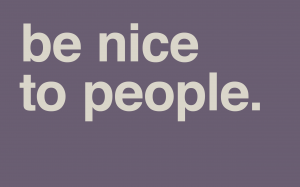 Under30CEO co-founder and my good friend Matt Wilson wrote a recent article, “How to Stop Being Nice and Get What You Really Want.” While I can’t begin to explain how much I respect Matt and his perspective, I strongly disagree with this particular point of view.
From Matt’s article, I deduced that “nice” means being thoughtful, fair, self-aware, and caring. I agree. The logic goes that somehow these attributes cause problems with making money, prioritizing focus, and ultimately getting what you want. I don’t see the causality. In fact, I see being “nice” and creating value as highly correlative.
Money flows from creating extrinsic value. To create extrinsic value you must change the world in some way others find meaningful. To change the world meaningfully requires scaling yourself beyond your immediate human limitations. To scale requires influencing others. To influence others requires charisma, and a large component of charisma is likability (the other is respect).
We all choose to help certain people while ignoring others. But why? It usually boils down to likability. How you treat me showcases your values and motives. The more likable you are, the more inclined I am to treat you well (reciprocity), and the greater the chance you have of influencing me. People we care about get our attention, and that attention drives action.
Let’s divorce likability from respect because they are fundamentally different. I respect Ari Gold’s abilities, but I don’t like him. I don’t dislike him because he’s direct (which is a beautiful thing) but because he’s self-absorbed, untrustworthy, and highly abrasive. I like my buddy Joe (name changed), but I think he’s lazy, lacks purpose, and is not particularly insightful. Neither Ari nor Joe is going to influence my behavior. The trick is to be both respected and likable.
I used the term extrinsic value earlier to describe things that others find meaningful. Logically, money can’t be the ultimate goal since it is nothing more than stored opportunity to purchase future resources. Purpose is the ultimate motive and is inherently subjective. I think most people would consider positively impacting the world as a meaningful purpose (“dent the world”). A small way to do this everyday is to treat people fairly and thoughtfully. Doing so requires self-awareness and an appreciation for things beyond your immediate circumstances. Sounds like a pretty damn likable and impactful person to me.
Life is an accumulation of tiny choices. Each day we’re faced with an endless array of conflicting propositions and must decide how to allocate our resources. Making a point to be “likable” not only helps you achieve extrinsic goals (money, fame, and power) but also actually helps you achieve the ultimate purpose of making the world a better place.
The choice isn’t between being liked and making money, or being successful, or getting what you want. The choice is between being an asshole and having a much more difficult time achieving those things.
The most ironic part of Matt’s whole article is that he is literally one of the most likable people I’ve ever met. He cares deeply about others and about positively impacting the world. I hope he doesn’t get distracted with shit that doesn’t matter, and as a friend it’s my job to call him out on it.
Now the real question: “Does that make me more or less likable?”
Brent Beshore is the CEO of AdVentures, ranked #28 on the 2011 Inc. 500 list of the fastest growing companies in the U.S.
Under30CEO co-founder and my good friend Matt Wilson wrote a recent article, “How to Stop Being Nice and Get What You Really Want.” While I can’t begin to explain how much I respect Matt and his perspective, I strongly disagree with this particular point of view.
From Matt’s article, I deduced that “nice” means being thoughtful, fair, self-aware, and caring. I agree. The logic goes that somehow these attributes cause problems with making money, prioritizing focus, and ultimately getting what you want. I don’t see the causality. In fact, I see being “nice” and creating value as highly correlative.
Money flows from creating extrinsic value. To create extrinsic value you must change the world in some way others find meaningful. To change the world meaningfully requires scaling yourself beyond your immediate human limitations. To scale requires influencing others. To influence others requires charisma, and a large component of charisma is likability (the other is respect).
We all choose to help certain people while ignoring others. But why? It usually boils down to likability. How you treat me showcases your values and motives. The more likable you are, the more inclined I am to treat you well (reciprocity), and the greater the chance you have of influencing me. People we care about get our attention, and that attention drives action.
Let’s divorce likability from respect because they are fundamentally different. I respect Ari Gold’s abilities, but I don’t like him. I don’t dislike him because he’s direct (which is a beautiful thing) but because he’s self-absorbed, untrustworthy, and highly abrasive. I like my buddy Joe (name changed), but I think he’s lazy, lacks purpose, and is not particularly insightful. Neither Ari nor Joe is going to influence my behavior. The trick is to be both respected and likable.
I used the term extrinsic value earlier to describe things that others find meaningful. Logically, money can’t be the ultimate goal since it is nothing more than stored opportunity to purchase future resources. Purpose is the ultimate motive and is inherently subjective. I think most people would consider positively impacting the world as a meaningful purpose (“dent the world”). A small way to do this everyday is to treat people fairly and thoughtfully. Doing so requires self-awareness and an appreciation for things beyond your immediate circumstances. Sounds like a pretty damn likable and impactful person to me.
Life is an accumulation of tiny choices. Each day we’re faced with an endless array of conflicting propositions and must decide how to allocate our resources. Making a point to be “likable” not only helps you achieve extrinsic goals (money, fame, and power) but also actually helps you achieve the ultimate purpose of making the world a better place.
The choice isn’t between being liked and making money, or being successful, or getting what you want. The choice is between being an asshole and having a much more difficult time achieving those things.
The most ironic part of Matt’s whole article is that he is literally one of the most likable people I’ve ever met. He cares deeply about others and about positively impacting the world. I hope he doesn’t get distracted with shit that doesn’t matter, and as a friend it’s my job to call him out on it.
Now the real question: “Does that make me more or less likable?”
Brent Beshore is the CEO of AdVentures, ranked #28 on the 2011 Inc. 500 list of the fastest growing companies in the U.S.
 Under30CEO co-founder and my good friend Matt Wilson wrote a recent article, “How to Stop Being Nice and Get What You Really Want.” While I can’t begin to explain how much I respect Matt and his perspective, I strongly disagree with this particular point of view.
From Matt’s article, I deduced that “nice” means being thoughtful, fair, self-aware, and caring. I agree. The logic goes that somehow these attributes cause problems with making money, prioritizing focus, and ultimately getting what you want. I don’t see the causality. In fact, I see being “nice” and creating value as highly correlative.
Money flows from creating extrinsic value. To create extrinsic value you must change the world in some way others find meaningful. To change the world meaningfully requires scaling yourself beyond your immediate human limitations. To scale requires influencing others. To influence others requires charisma, and a large component of charisma is likability (the other is respect).
We all choose to help certain people while ignoring others. But why? It usually boils down to likability. How you treat me showcases your values and motives. The more likable you are, the more inclined I am to treat you well (reciprocity), and the greater the chance you have of influencing me. People we care about get our attention, and that attention drives action.
Let’s divorce likability from respect because they are fundamentally different. I respect Ari Gold’s abilities, but I don’t like him. I don’t dislike him because he’s direct (which is a beautiful thing) but because he’s self-absorbed, untrustworthy, and highly abrasive. I like my buddy Joe (name changed), but I think he’s lazy, lacks purpose, and is not particularly insightful. Neither Ari nor Joe is going to influence my behavior. The trick is to be both respected and likable.
I used the term extrinsic value earlier to describe things that others find meaningful. Logically, money can’t be the ultimate goal since it is nothing more than stored opportunity to purchase future resources. Purpose is the ultimate motive and is inherently subjective. I think most people would consider positively impacting the world as a meaningful purpose (“dent the world”). A small way to do this everyday is to treat people fairly and thoughtfully. Doing so requires self-awareness and an appreciation for things beyond your immediate circumstances. Sounds like a pretty damn likable and impactful person to me.
Life is an accumulation of tiny choices. Each day we’re faced with an endless array of conflicting propositions and must decide how to allocate our resources. Making a point to be “likable” not only helps you achieve extrinsic goals (money, fame, and power) but also actually helps you achieve the ultimate purpose of making the world a better place.
The choice isn’t between being liked and making money, or being successful, or getting what you want. The choice is between being an asshole and having a much more difficult time achieving those things.
The most ironic part of Matt’s whole article is that he is literally one of the most likable people I’ve ever met. He cares deeply about others and about positively impacting the world. I hope he doesn’t get distracted with shit that doesn’t matter, and as a friend it’s my job to call him out on it.
Now the real question: “Does that make me more or less likable?”
Brent Beshore is the CEO of AdVentures, ranked #28 on the 2011 Inc. 500 list of the fastest growing companies in the U.S.
Under30CEO co-founder and my good friend Matt Wilson wrote a recent article, “How to Stop Being Nice and Get What You Really Want.” While I can’t begin to explain how much I respect Matt and his perspective, I strongly disagree with this particular point of view.
From Matt’s article, I deduced that “nice” means being thoughtful, fair, self-aware, and caring. I agree. The logic goes that somehow these attributes cause problems with making money, prioritizing focus, and ultimately getting what you want. I don’t see the causality. In fact, I see being “nice” and creating value as highly correlative.
Money flows from creating extrinsic value. To create extrinsic value you must change the world in some way others find meaningful. To change the world meaningfully requires scaling yourself beyond your immediate human limitations. To scale requires influencing others. To influence others requires charisma, and a large component of charisma is likability (the other is respect).
We all choose to help certain people while ignoring others. But why? It usually boils down to likability. How you treat me showcases your values and motives. The more likable you are, the more inclined I am to treat you well (reciprocity), and the greater the chance you have of influencing me. People we care about get our attention, and that attention drives action.
Let’s divorce likability from respect because they are fundamentally different. I respect Ari Gold’s abilities, but I don’t like him. I don’t dislike him because he’s direct (which is a beautiful thing) but because he’s self-absorbed, untrustworthy, and highly abrasive. I like my buddy Joe (name changed), but I think he’s lazy, lacks purpose, and is not particularly insightful. Neither Ari nor Joe is going to influence my behavior. The trick is to be both respected and likable.
I used the term extrinsic value earlier to describe things that others find meaningful. Logically, money can’t be the ultimate goal since it is nothing more than stored opportunity to purchase future resources. Purpose is the ultimate motive and is inherently subjective. I think most people would consider positively impacting the world as a meaningful purpose (“dent the world”). A small way to do this everyday is to treat people fairly and thoughtfully. Doing so requires self-awareness and an appreciation for things beyond your immediate circumstances. Sounds like a pretty damn likable and impactful person to me.
Life is an accumulation of tiny choices. Each day we’re faced with an endless array of conflicting propositions and must decide how to allocate our resources. Making a point to be “likable” not only helps you achieve extrinsic goals (money, fame, and power) but also actually helps you achieve the ultimate purpose of making the world a better place.
The choice isn’t between being liked and making money, or being successful, or getting what you want. The choice is between being an asshole and having a much more difficult time achieving those things.
The most ironic part of Matt’s whole article is that he is literally one of the most likable people I’ve ever met. He cares deeply about others and about positively impacting the world. I hope he doesn’t get distracted with shit that doesn’t matter, and as a friend it’s my job to call him out on it.
Now the real question: “Does that make me more or less likable?”
Brent Beshore is the CEO of AdVentures, ranked #28 on the 2011 Inc. 500 list of the fastest growing companies in the U.S.




